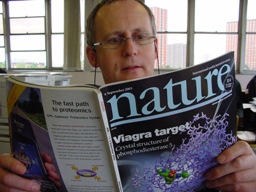 A gaggle of disgruntled boffins, many of them distinguished Fellows and award winners of this Society, put their names to a stinging letter of rebuke in February. Their target? The UK research councils.
A gaggle of disgruntled boffins, many of them distinguished Fellows and award winners of this Society, put their names to a stinging letter of rebuke in February. Their target? The UK research councils.
Geoscientist 19.4 April 2009
Readers of Geoscientist will recall Professor Donald Braben’s (UCL) Soapbox article(December 2008) about the foolishness of directed research funding, entitled The Wizard’s Tale. Well, Braben has been at it again, this time on a slightly grander scale; and brought his friends – 20 of them – including, from among our number, such luminosities as Hubert Huppert (Cambridge), Steve Sparks (Bristol), and Claudio Vita-Finzi (NHM).
The brouhaha concerns the UK Research’ Councils’ latest insistence that applicants for research money should make a two-page summary of the “potential social or financial aspects” of their proposal. The idea springs from Science Minister Lord Drayson’s idea to “focus” (as he might put it) the UK’s basic research effort on areas deemed most likely to be of economic benefit. The proposal is dressed up in disclaimers that it’s not just “picking winners” again, but yes, it’s “picking winners” again. Those of us longer in the tooth than we would like have seen it all before; but that does not mean that familiarity should breed complacency. Braben & co.’s letter, which calls on researchers to boycott the scheme, was published in the Times Higher Education on 12 February 2009.
The text acknowledges a sorry history during which blue skies research and the freedom of academics to pursue it in the UK has been steadily eroded, and complain of 30 years of much the same sort of dirigisme, which (they say) has subjected scientists to “barrages of control” and turned their lives into a “bureaucratic nightmare”. It also complains that the Government appears to be attacking researchers, an easy target, rather than a real culprit, UK business - whose stingy record in basic R&D is legendary. Echoing his wizarding alter-ego, Braben told reporters: “You cannot command developments at the frontier – it is not possible”.
Neil Turok, the theoretical physicist who recently left Cambridge for fresh fields and pastures new in Canada, recently gave an interview affirming that the grass he has found there is indeed greener. Nor does he miss either the “lack of vision” of Whitehall or myopic British business, which he says only funds research when it can see a widget at the end of it all. Nor does he miss much about Cambridge University which, Turok says, needs to offer its Lucasian Professors and the like a good deal more than college dinners if it is to help them swallow that other, less palatable substance that UK researchers are forced to eat all the time.
Turok was naturally upset when Cambridge University refused to create his proposed “Stephen Hawking Institute for Theoretical Physics”. Perhaps the unattractive acronym put them off. Perhaps it was the money. Or perhaps, most seriously of all, it was lack of people who (in Turok’s words), “believe in science and what it can do”. Fur ultimately it is they, wherever they are, who choose to martyr scientists on the cross of accountability rather than believe that the best way to manage and retain dedicated, creative people is to help them when they ask you to, but otherwise - leave them alone.